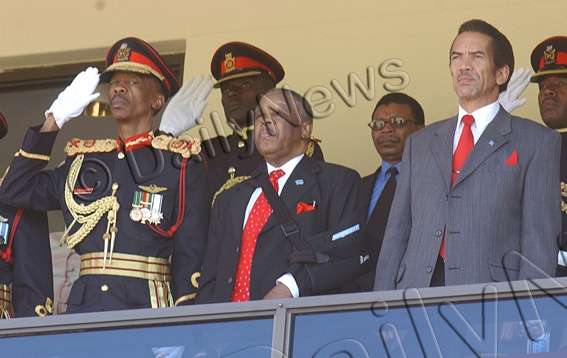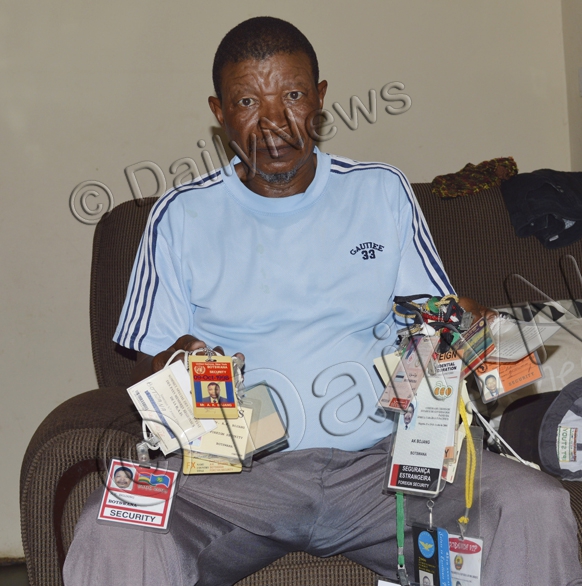Bojang From humble beginnings to presidential body guard
29 Jan 2019
Albert Bojang, son of Mr Andrew Tshekiso and Ms Popie Bojang, was born on June 2, 1952 to a poor family with few opportunities for survival, except rearing of livestock, which provided livelihood for most families at the time because of the barren landscape of the Kgalagadi.
The man, who had the honour of protecting three presidents of the Republic of Botswana, Sir Seretse Khama, Sir Ketumile Masire and Dr Festus Mogae, could not help but express gratitude to have served honourably for more than three decades as a presidential body guard.
Mr Bojang started his formal education in 1961 at Khuis Bantu School situated just across the border in the neighbouring South Africa. He then proceeded to Bogogobo to finish Sub-b (equivalent of Standard 7) from which he got second class (B).
His father was not keen on him pursuing an educational path at first because at the time, most of his colleagues were migrating to work in the mines in South Africa and sent money to support their families.
So his father wished he could do the same. “I resisted and subsequently sold a few cattle I had at the time and continued my education at Itireleng Secondary School in Lobatse,” he recalls.
He later realised that ‘fortune favours the brave’ as his decision to continue schooling bore fruit.
He divulged that the fees for a private school were steep at the time, but fortunately lady luck shone on him as his cousins, who were already working by then, Moremi Tumaeletse and Matlhaletlhale Setshogela came to his rescue and supplemented the fees for his studies; a gesture he says he would be eternally grateful for. “Upon completing my Junior Certificate in 1973, for which I got third class, instead of going back home, I decided to head for Gaborone to look for a job,” Mr Bojang said.
He said that his perseverance paid off as he landed his first gig at what was Post and Telecommunication (P&T) currently BotswanaPost, as a labourer. “I was very happy about my first job and as such did it to the best of my ability” he reminisced, adding that his responsibility was to install telephones in offices and private homes.
He pointed out that although the pay was low at the time, how he did this job helped mould him into a responsible young man and gave him workplace experience, which would be invaluable in future.
“The years spent at P&T were memorable and I felt I needed a new challenge and an opportunity presented itself when I stumbled upon an advert in the DailyNews, which I applied for and was admitted into the Botswana Police Force. “I never imagined being a police officer at all. Only after I started working as one did I realise just how good I was at it,” he said.
Mr Bojang said all the virtues his parents instilled in him being hard work, honesty, integrity and accountability for one’s actions proved invaluable, adding ‘I was young then, but responsible’.
He revealed that the task of being a police officer was not an easy one, especially with a hostile neighbour in South Africa and its apartheid regime.
“A year into the police force my hard work and determination caught the attention of my superiors, who transferred me to the Special Branch at the State House as a member of the VIP Protection Unit,” he said.
“It was here that I first met former president Sir Seretse Khama and Lady Ruth. I was very nervous at the sight of the president because from the stories I heard he was a strict man, only later after getting to know him better did I realise that most of the stories were exaggerated,” he admitted jokingly.
Mr Bojang recalls how the first president loved hunting and was an excellent marksman. He was also generous as he would always share the spoils of his kill evenly among his employees.
He remembers him as being firm and professional in office, but a dedicated husband and loving father at home. Their working relationship would be short lived as on July 12, 1980, Sir Seretse Khama drew his last breath, leaving a nation gripped with grief and sorrow. Mr Bojang said his passing brought Sir Ketumile Masire into office, and he was no different from his predecessor; as both were compassionate and caring.
He said President Masire had a ranch in Gantsi and would on occasions slaughter a beast and share it with his entourage.
The privilege of providing protection for such important figures was ominous and not without risk as he would later realise. “You have to be sharp and vigilant at all times because mistakes in our profession could lead to fatal consequences,” he said, adding ‘your job or responsibility is not only to the president, but to the whole nation he leads’.
“I recall how President Masire introduced cost saving measures to keep government running.
During African Union summits most heads of states would arrive in state of the art Boeing aircraft, while our president was transported in a chartered seven seater plane,” he reminisced.
He said President Masire used to encourage them to ‘nna motlotlo ka ko o tswa teng,’ (be proud of where you come from), adding that he and president Kenneth Kaunda were good friends as on every odd occasion, they would fly together to the AU summits. Mr Bojang recalls one incident that he says will be forever be etched in his mind; when President Masire was to travel to Mozambique in 1986 to attend the funeral of Samora Machel, whose plane was shot down.
“We travelled ahead of him to make preparations for his arrival and what we saw there really scared me. The airport was riddled with bullet holes and just behind the main building were corpses.
I remember telling my colleague how I wished the President could reconsider attending the funeral because the situation there was volatile,” he said with a deep breath. He said although the atmosphere was tense, they were fortunate enough because the funeral processions took place without any incident and he was relieved when it was all over.
The former body guard says that the good bilateral relations between Botswana and other countries saw the security improving rapidly, since secret intelligence training was now provided by the US and France, among others.
Some of the highlights of his career include meeting different heads of state and travelling to cities across the world, although he does admit to have missed the quietness of rural Kgalagadi during these trips.
Mr Bojang praised the professionalism of some of the officers he was working with at the time, specifically mentioning Phillip Steenkamp, the then permanent secretary to founding President Seretse Khama and Legwaila Legwaila, who took over the reins from Steenkamp.
He alluded to the fact that both gentlemen were his biggest motivation in the way they executed their duties and were morally upright citizens who would not hesitate to air their honest opinion and give constructive advice on issues pertaining to the welfare of Batswana, regardless of who they differed with, even the president was no exception.
“In 1998 President Mogae took over from President Masire and during this time, I was still part of the protection detail having amassed a lot of experience in my job, thanks to the unit remaining mostly unchanged through the years. His presidency was smooth sailing as we did not encounter any serious safety breaches,” Mr Bojang recalls.
After spending more than 30 years in the public scene, he retired in 2012 and now spends most of his time in Middlepits, rearing livestock he has accumulated over the years as well as spending time with his youngest daughter, whom he refers to as ‘the joy of my heart’.
Asked what advice he has for people wishing to pursue a similar course of career as he did, he encouraged them to always maintain professional standards, strive to be the best and be able to make personal sacrifices for the greater good of others.
Mr Bojang also spoke with pride how Botswana has grown from being one of the poorest countries to a middle income economy.
“I am specifically proud that during my tenure on the protection detail our unit has not on any occasion knowingly compromised the safety of those we were charged to protect,” he said.
Quizzed on whether he had any regrets of the life he lived, officer quad 4 (No 4444) said given another chance, he would do it all over again because patriotism is a duty each citizen needs to embrace wholeheartedly, adding that ‘once a soldier always a soldier’. ENDS
Source : BOPA
Author : Steven Bock
Location : TSABONG
Event : Interview
Date : 29 Jan 2019








